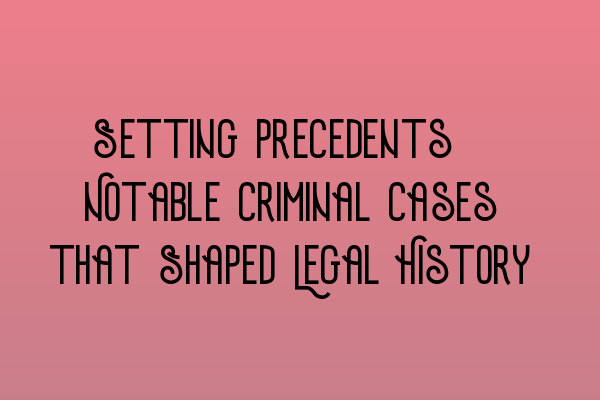Setting Precedents: Notable Criminal Cases that Shaped Legal History
As criminal law solicitors, we are well aware of the significance of precedent-setting cases in shaping the legal landscape. These landmark cases not only redefine legal principles but also influence the way future cases are approached and decided upon. In this blog post, we will explore some notable criminal cases that have left a lasting impact on legal history.
The Case of R v Caldwell
The landmark case of R v Caldwell, which dealt with the concept of recklessness in criminal law, is a perfect example of how one case can redefine an entire principle. In this case, the House of Lords introduced the subjective test for recklessness, stating that an individual is reckless if they consciously take an unjustifiable risk. This case opened up new avenues for legal argumentation and set an important precedent for future cases involving recklessness.
The Case of R v Haigh
R v Haigh is another significant case that shaped legal history, specifically in relation to the defense of diminished responsibility. In this case, the Court of Appeal widened the scope of the defense by ruling that psychiatric conditions causing personality disorders could be considered as a form of diminished responsibility. This decision set a precedent by acknowledging the impact of mental health on an individual’s culpability, leading to a more nuanced approach in criminal cases.
The Case of R v Woolin
R v Woolin is a leading case that redefined the concept of mens rea, or the mental element of a crime. In this case, the House of Lords clarified the definition of “intention” and introduced the notion of virtual certainty. The court stated that if an accused person foresees the outcome of their actions as a virtual certainty, they can be considered to have intended that outcome. This precedent has had a profound impact on how intent is assessed in criminal cases ever since.
The Case of R v Jogee
The case of R v Jogee brought about a significant shift in the law of joint enterprise. Prior to this case, individuals involved in a crime where someone else committed a fatal act could be held equally responsible for murder, even if they did not directly cause the death. However, the Supreme Court in Jogee held that it was wrong to equate foresight with intent and revised the law of joint enterprise. This groundbreaking decision has led to a reassessment of numerous past convictions and a more nuanced approach to determining individual culpability.
Conclusion
These are just a few examples of the many notable criminal cases that have shaped legal history. From redefining the principles of recklessness and diminished responsibility to refining the concepts of mens rea and joint enterprise, these cases have played a crucial role in the development of criminal law. Understanding and analyzing these cases helps us provide effective legal representation and navigate the complexities of the legal system.
If you’re interested in furthering your knowledge of criminal law and preparing for the SQE exams, we recommend checking out our related articles:
- SQE 1 Practice Exam Questions
- SQE 1 Practice Mocks FLK1 FLK2
- SQE 2 Preparation Courses
- SQE 1 Preparation Courses
- SRA SQE Exam Dates
At SQE Criminal Law & Practice Law UK, we are committed to providing comprehensive resources and expert guidance to help aspiring solicitors succeed in their legal career. Stay tuned for more informative blog posts and educational content!
